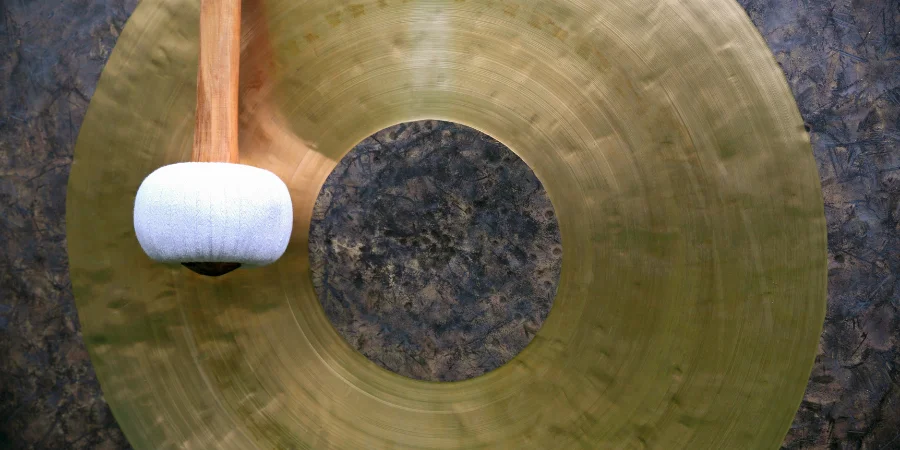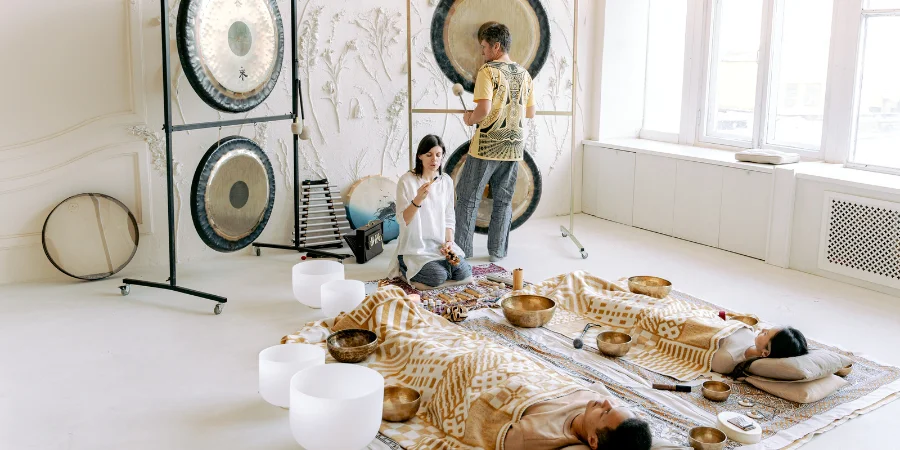
Written by:
Last Updated:
March 10th, 2025
Gong Therapy | Benefits and How it is Implemented
In today’s modern world, we seem to be drowning in sounds, from the sharp noise of buzzing phones to our blaring televisions and Spotify playlists.
But how about using sound to escape the modern world? Countless studies have pointed to the effectiveness of sound in enhancing physical and mental wellbeing, with musical intervention having the ability to positively impact mood as well as anxious or depressive symptoms. For more information about gong baths, how we use them here at Primrose Lodge, and the benefits of this form of therapy in addiction treatment, read on for more information.
What is a gong bath?
When people imagine a gong bath, their minds usually wander to water or plunging into a warm pool for a relaxing soak. However, gong baths do not actually involve water and are instead a form of therapy that incorporates one fundamental component – sound.
The gong is an instrument that can be traced back centuries, playing a part in ceremonies and processions, as well as being renowned for its healing and restorative qualities. Used by numerous cultural traditions and practices, the gong was employed to treat ailments and health conditions, with many believing that the sounds produced by the instrument could take users on a journey through sound, boosting physical wellbeing and promoting balance in the body and mind.
Often compared to a contact-free massage, gong baths employ varying sounds and frequencies to effectively ‘wash over’ participants until they are totally immersed in the gentle vibrations produced by the gong. These sounds do not just enter the body through the ears but instead radiate through the entire body. In this type of music therapy, meditators lay on the ground as sounds reverberate and envelop all of those who take part.
While this practice is thousands of years old, the gong bath has also been backed by medical professionals who appreciate the high-intensity, low-frequency sounds produced by the gong to induce a deep relaxation response for all those who take part in the therapy.
What happens during gong bath meditation?
At Primrose Lodge, we have used gong bath meditation as a form of therapy for years, confident in the transformative capabilities of this treatment for our clients, wherever they might be in their recovery journeys. Our sessions are typically held on Fridays, as this gives an excellent opportunity to wind down after a long week of workshops and sessions. Held by our in-house gong therapist, the treatment usually lasts about an hour.
During a gong bath meditation, clients remain fully clothed and lie down in a comfortable position. In the centre of the room, the session leader will gently strike the gong until the room is filled with sound. The clients might be asked to sit in different positions to encourage relaxation or simply lay on their backs. It is not uncommon for those taking part in the treatment to fall into a deep and peaceful sleep brought on by the soothing vibrations of the gong.
Why are gong baths beneficial to treatment?
While the gong bath is proven to be effective in reducing stress and restoring calm in users, the benefits go far beyond this, and those recovering from addiction find this form of treatment particularly valuable. Some of the benefits include:
Relieves anxiety and depression…
Gong baths can be an incredibly therapeutic experience, with participants reporting a significant reduction in negative emotions such as anger, fatigue, and depression. This is perhaps because of the tranquil nature of the meditation allowing the brain to slow down and relax, taking time to process thoughts and emotions.
This therapy can also ensure that, instead of turning to habit-forming substances or behaviours as a crutch to escape, clients can work through their stress in a healthier way, developing useful coping strategies so that once they leave us, they no longer need to turn to addictive behaviours again.
Improved Sleep…
Those in treatment will be learning to adjust back to healthy living, nourishing their bodies with a balanced diet and stimulating their minds through therapeutic activities. To add to this, one of the most important elements of any successful treatment plan is restorative, high-quality sleep. Along with healing properties, gong bath meditation is very effective in aiding restful relaxation, with many clients admitting to feeling so relaxed that they had fallen asleep after just a few minutes in our therapy room!
Restores balance…
It is common for those in recovery to feel slightly off-kilter or run down as they begin treatment. This is because addiction is known to alter brain composition, with the behaviours brought upon by dependence causing the brain to absorb, produce, and transmit less dopamine than it once did, which can result in chemical imbalances.
However, gong baths are a fantastic way to achieve homeostasis, with the repetitive, grounding nature of the gong stimulating healing and restoration. This means that, after just a few sessions, clients tend to feel more in sync and at one with their bodies.
Feel better physically…
Gong baths do not just work for the mind, but the therapy interacts with your entire body, whether that be your joints, muscles, or your bones. For muscles that are tight or tense, the soothing vibrations of the gong have been said to release tension, leaving you feeling lighter and more relaxed than you did before.
Some other physical benefits of gong therapy include:
- Regulates blood pressure
- Steadies heart rate
- Relaxes muscles
- Reduces tension
Bringing you into the now…
For many individuals struggling with addiction, it is common for them to project themselves into their past or their future, becoming so clouded by these events that they struggle to be fully present in treatment. Gong baths are a great way to shift clients’ focus to the now, which is beneficial in ensuring that they prioritise themselves in their treatment, working toward a healthier future.
Gong baths place clients in an environment free from distractions, with only one sound to focus on. Being placed in a space like this with an all-encompassing instrument like the gong makes it impossible not to focus attention on the instrument and its complex, ever-changing vibrations. In fact, this focus often leaves mediators with intense clarity, calm and peace following a session.
How can I incorporate gong bath meditation into my treatment plan?
At Primrose Lodge, we provide a holistic approach to treatment, one which considers all our clients’ needs collectively; on an emotional, physical, and spiritual level. Gong baths are a great example of this, and with countless benefits, every individual is bound to find something that suits them in this unique, all-encompassing music therapy. If you would like to learn more about gong bath meditation and how this method of treatment can help you, contact a member of our team today.
Frequently asked questions
Disclaimer:
The availability of therapies may vary across UKAT centres. The specific therapies provided will be determined based on your treatment plan and the programme offered at your chosen facility. All treatments are subject to clinical assessment and programme availability at the time of admission. For further details on the therapies included in your treatment plan, please contact our admissions team.





